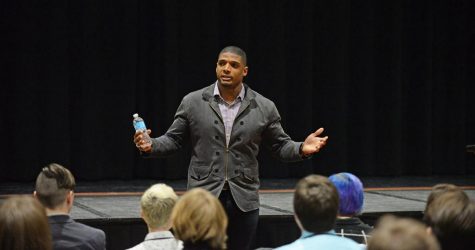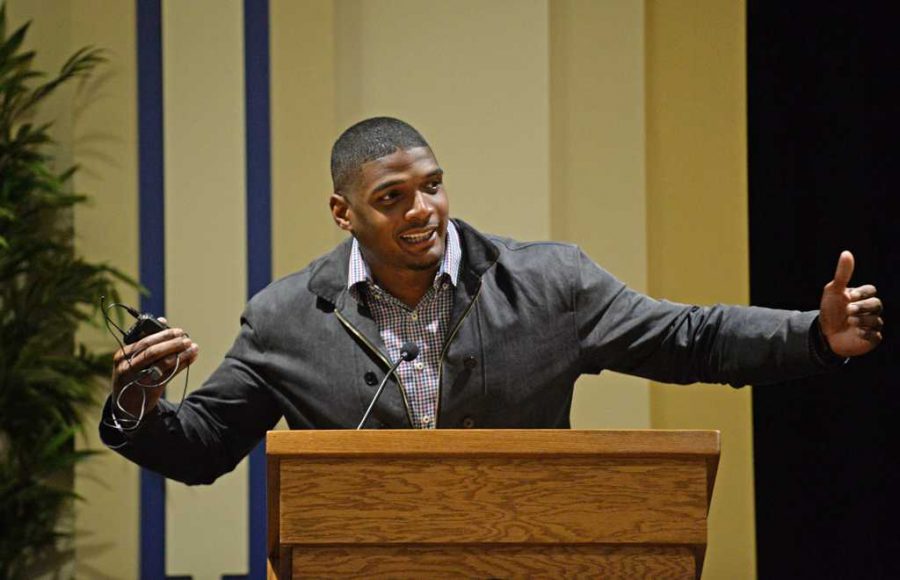Michael Sam didn’t set out to make a name for himself as a gay athlete — he just wanted to play football.
But when a teammate’s cousin said Sam’s story inspired her against taking her life, Sam realized how influential he could be.
Sam told this story Tuesday night as part of the Rainbow Alliance’s second day of Pride Week. The group also hosted a panel from 5 to 6:30 p.m. in the Assembly Room of the William Pitt Union called “The Pitt LGBTQIA+ Experience: Past, Present and Future.”
Sam, the NFL’s first openly gay athlete, who is now a free agent, followed the event with a lecture and Q&A about his experiences before and after coming out.
The eight panelists included former presidents and members of the Rainbow Alliance, current Pitt students, faculty from Pitt’s Gender, Sexuality, and Women’s Studies Department and University leadership.
Brandon Benjamin, a Pitt graduate and former president of the Rainbow Alliance, moderated the event. They said the most “surprising” takeaway from the panel was the way Pitt students engaged with policy and activism in the LGBTQ+ community and beyond.
“Hunger strikes and lawsuits aren’t the first things people assume happen on college campuses, but the advances we’ve made at Pitt in the last two decades are a testament to the power of student coalitions,” Benjamin said. “I hope that these sorts of programs help young activists find their roots and continue the hard work of me, my peers and our predecessors.”
After the panel concluded at 6:30 p.m., Rainbow Alliance members shuffled to set up for Sam’s speech as new guests trickled in to hear the former football player speak.
While Sam didn’t build his career around LGBTQ+ activism, his status as an openly gay athlete made him a public figure and a role model for young, non-hetero athletes.
“It wasn’t until I started to scroll through my social media [after coming out] that I started to realize how many people looked up to me,” Sam said.
About 75 people showed up to form an intimate crowd — prompting Sam to ditch his position at the podium and speak directly to members of the audience without a microphone.
Rather than jumping into his career as an athlete, Sam started from the very beginning, explaining how the losses of three of his eight siblings as a child formed his character later in life.
Sam’s oldest sister drowned before he was born, and when he was 5 years old, his oldest brother was shot. His other brother, Julian, went missing in 1998 and Sam saw him for the last time that October.
After a series of tragedies, Sam needed an outlet. He convinced his parents to let him play football in high school, after serving as the team’s waterboy in eighth grade.
“The best thing my dad did for me,” Sam said, “was convince my mother to let me play football and sports.”

Alex Nally | Staff Photographer
His career took off from there — several top Division I universities recruited Sam as a high school athlete. After accepting an offer from the University of Missouri, Sam said he planned to “experiment” with his sexuality and figure out if his feelings for people of the same sex amounted to more than just a passing interest.
“The first day I was at Missouri — during my first interaction with a guy — I realized I was gay,” Sam said.
In the locker rooms, Sam said his teammates used to talk about how they never saw him around campus with a girl. One night, Sam said he purposely went out his way at a party to talk with a woman to keep the rumors at bay.
But when he met and began hanging out with another gay college athlete, the rumors flew.
After graduating from college with numerous accolades including 2013 SEC Defensive Player of the Year and amassing 11.5 sacks his senior year, Sam turned his attention to the NFL Draft.
In an interview with ESPN on Feb. 9, 2014, before the NFL Draft, Sam publicly came out as gay. People were still shocked when Sam kissed his boyfriend on TV after the St. Louis Rams drafted him in the seventh and final round of the 2014 NFL Draft.
The Rams cut him from the roster during the 2014 preseason — during which Sam tied for fourth in the NFL with three sacks. The Dallas Cowboys added him to their practice squad Sept. 3, 2014, before dropping him again Oct. 21, 2014.
“I was so naive. I thought it’d blow over,” Sam said of his sexuality. But it didn’t — Sam’s announcement was met with an onslaught of media attention.
Chris Bennett, a senior film studies major who attended Sam’s speech, said he hadn’t known much about Sam other than his status as a gay draft pick.
“I did not know all the details of his personal life,” Bennett said, “but it’s amazing to see and hear an athlete talk about their experience with the LGBT community.”
Marcus Robinson, president of the Rainbow Alliance, said the evening’s events were centered around hearing experiences like Sam’s, so attendees could understand what changes need to be made.
“We wanted to have an event that addressed where Pitt is now with the LGBT community,” Robinson said, “as well as allow people to talk about their different experience and ways they saw the community moving forward in the future.”
Saron Shiferaw, who asked Sam how he has dealt with being openly gay in the black community, said she wanted to draw a connection between often-stigmatized groups of people.
“I think it was great for him to talk about racism within LGBT. It’s important to emphasize the intersection between the two,” Shiferaw, a graduate student, said.
Sam still plans to make it back in the NFL. Even if he doesn’t, he said he’s happy knowing that he’s motivated people to reevaluate their views on the LGBTQ+ community.
“What I learned these past few years is that everyone has a story,” Sam said, “and it’s important we start listening to each other.”


